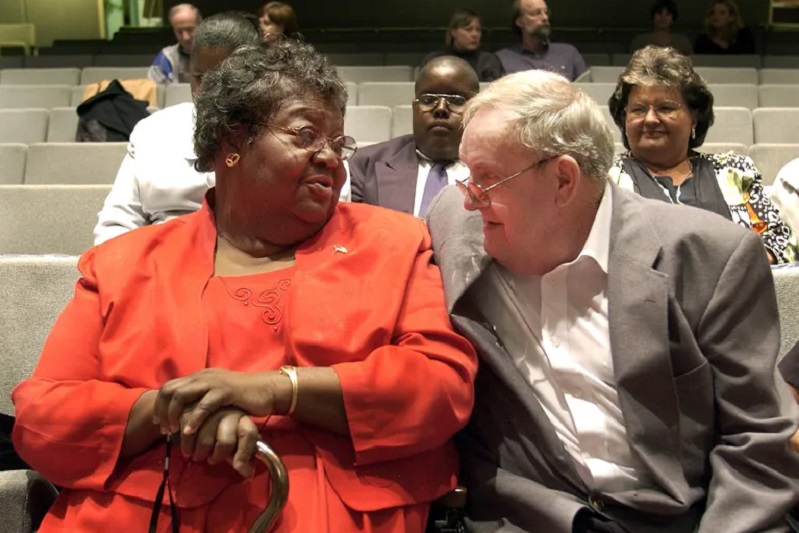University Libraries

Real Dialogue, Real Change
By Joan Milligan
A single story of a friendship developing between a civil rights activist and a Ku Klux Klan leader seems improbable and therefore worth sharing. Here are two such stories.
Xernona Clayton
In the 1960s, Xernona Clayton and her husband moved to Atlanta to support Martin Luther King Jr.’s efforts. The mayor offered Clayton a job as director of the Model Cities program, working with the chairs of five communities. She was told that getting along with one of the chairs might be difficult. When she was introduced to Calvin Craig and received a handshake that was more of a fingertips-shake, she guessed this was the one.
Still, they were both warm, personable people. Craig would stop by her office to say hello. He began visiting more regularly, which surprised Clayton. He was a Grand Dragon in the Ku Klux Klan and an active advocate for racial segregation. She always welcomed him but finally asked why he came by to speak with her since they didn’t agree on much of anything. He replied that she was fun to talk to.
Over time Craig heard about her life. It astonished him that she threw dinner parties that included white guests. She spoke about her church and her beliefs. He was an active churchgoer himself. She did not lecture; she did not argue — and she did not hide her opinions either. Her sense of humor and the conversations they had made an impact. One day Craig called a press conference and announced he was quitting the Ku Klux Klan.
Ann Atwater
In Durham, N.C., Ann Atwater and C.P. Ellis had a much more difficult time forging a relationship. Atwater was poor and on her own with two children when she became an advocate for Operation Breakthrough, a program to help people escape poverty. Ellis worked at a gas station and was the Exalted Cyclops of the Ku Klux Klan. In 1971 a community organizer asked them to co-chair community meetings about school desegregation — long overdue since the Brown v. Board of Education of Topeka, Kansas decision made segregation illegal nearly 20 years before. Atwater and Ellis disliked each other. They reluctantly agreed.
They had many heated arguments, but one day Ellis realized they had something in common. His children and hers were being ostracized at school because they were working together on desegregation. He began to talk more with Atwater, and together they realized they had many things in common. They had both grown up poor and struggled through hardship. They both cared about education and their children. By the time the community meetings process was done, Ellis had left the Ku Klux Klan, and the two had become good friends.
These stories are documented and available through Roesch Library or your local library.
- I've been Marching All the Time, by Xernona Clayton (1991). Autobiography. Book
- An Unlikely Friendship (2002). Documentary of Atwater and Ellis. Streaming video
- Best of Enemies (2019). Dramatization of Atwater and Ellis’ story. DVD
- Unfollow: A Memoir of Loving and Leaving the Westboro Baptist Church, by Megan Phelps-Roper (2019). Autobiography of how dialogue with others on Twitter changed her beliefs. Book
- Race Dialogues: A Facilitator's Guide to Tackling the Elephant in the Classroom, by Donna Rich Kaplowitz, Shayla Reese Griffin, Sheri Seyka (2019). Book
To learn more about fostering understanding with others, I invite you to view:
- The libraries’ Dialogue Resources research guide.
- Upcoming events at the Dialogue Zone in Roesch Library.
- Opportunities available through UD’s Office of Diversity and Inclusion.
Photo credit: AP Photo / Grant Halverson
— Joan Milligan is a special collections cataloger for the University Libraries and a member of the libraries’ diversity and inclusion team.

Ann Atwater and C.P. Ellis
Ann Atwater, an advocate for the poor, and C.P. Ellis, a former member of the Ku Klux Klan, became friends when they discovered through time and dialogue that they had more in common than they thought. Ellis left the KKK after a series of community meetings about school desegregation.
Ann Atwater and C.P. Ellis

